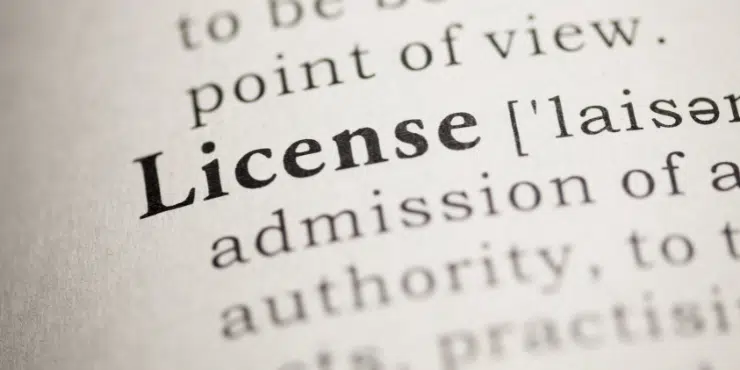Starting an online business can be a great entrepreneurial endeavor to take on – but there’s no denying that navigating the waters of setting up your digital storefront can be overwhelming. If you’re getting ready to launch your own ecommerce website, one key question is whether or not you need a business license to sell online. The answer depends on several factors, and answering this essential inquiry can help alleviate some stress as you move forward with creating an internet store.
In this post, we’ll explore whether or not you need a business license when launching an online store. By analyzing various factors, such as your location and product selection, you’ll better understand what kind of paperwork may be necessary for launching your new enterprise.
So if you’re ready to learn more about how to avoid any potential pitfalls associated with starting an online venture, read on!
What Is a Business License?
A business license is an official government-issued document that effectively permits organizations to operate a business. It is the key to unlocking specific resources, like access to different markets and customers, and provides organizations with the ability to purchase goods and services without having to pay certain taxes.
As part of the application process for a business license, applicants must provide proof that their business carries legal liability insurance and outlines any restrictions in accordance with local zoning requirements.
Additionally, organizations must also outline what type of activities will take place on company property. These parameters establish boundaries within which businesses must abide in order to provide goods and services legally per local law. A business license can be essential for reputation management since third-party verification allows organizations to protect their true identity while interacting with customers online.
Are You Required to Have a Business License in Order to Sell Online?
Depending on the nature and jurisdiction of your online business, you may be required to obtain a business license to sell online legally. Getting a business operation license involves proving that you are following legal regulations, such as filing reports with the IRS and ensuring that you meet selling standards within the local municipality.
Additionally, a business license will grant you access to benefits such as tax deductions, legal rights, and easier loan approval. Researching what type of license is needed will help keep your online business compliant while also providing further resources and opportunities when paying sales tax.
Overall, while no universal law requires a business license for all online ventures, understanding local regulations and laws before getting started can save headaches dealing with paperwork after completing sales.
Do Established Stores Need a Business License to Sell Online?
When it comes to selling goods and services online, whether a business needs a license depends on where the store is based. Established stores wishing to sell their products online may need an additional occupational license to operate legally. This can vary by state and city, as some jurisdictions require businesses with physical stores to register their establishments offline and online if they wish to transact digitally. This may include obtaining permits, providing proof of identity, and following zoning regulations.
Ultimately, if an established store begins selling goods or services online, they need to research licensing requirements in its area to remain compliant with local laws and regulations.
Requirements of Online Selling
Before launching an online store, entrepreneurs must keep in mind that certain regulations may apply to their business. This includes the following:
Complying With Taxation Laws
Selling online has become an increasingly popular way for businesses to expand their customer base and boost their profits. While it comes with a range of benefits, selling products or services over the internet also requires merchants to complete several essential legal steps, such as complying with the taxation laws of different countries and regions.
Every seller should know that they must plan ahead and comply with the compliance requirements across different jurisdictions. Not only are there national policies, but certain states within a country may have different regulations, too. Furthermore, understanding the type of taxes applicable to each business transaction is essential – these could include sales tax license, value-added tax, goods & services tax (GST), withholding taxes, etc.
Finally, filing returns regularly is a must – businesses need to double-check the returns on their bank account for accuracy and ensure their associated fiscal obligations have been taken care of in order to comply with taxation laws worldwide. Failure to do so could result in hefty penalties, which could disrupt operations further down the line; businesses should certainly heed the above advice if they want to succeed online!
Registering for Permits
Online selling has become increasingly popular as technology has made remote commerce easy and accessible. Registering for the right seller’s permit is essential for successful online selling – without them, the business owner faces the risk of punishment or legal action. The required permits will vary depending on your location and the type of business you’re running.
For instance, in some cases, a general or online business license may be enough. But if you are dealing with trade regulations, environmental regulations, zoning, or taxes, there may also be specific laws that you must abide by, which often require special permits.
Moreover, it’s important to note that sometimes these permits have an expiration date and must be renewed regularly to stay compliant with the law. Failing to do so can result in heavy fines or other serious legal consequences.
Registering for all necessary permits before engaging in any selling activities is a crucial step to selling online safely and efficiently.
Maintaining Data Security
In the online retail space, it’s essential to ensure that customer data is safe and secure. Encrypting all customer information upon collection and having a secure payment system are two requirements of selling online that guarantee customers’ data isn’t compromised or misused.
Furthermore, being transparent with your website’s privacy policies demonstrates a commitment to safeguarding customers’ financial and personal information. Additionally, using strong passwords for each account is often overlooked but necessary for protecting data since it guarantees the security of any accounts you use, including customers’ personal accounts.
Lastly, be sure that your websites have reliable firewalls; this is an easy way to guard against cyber-attacks which can lead to a risk of data intellectual property theft. These security measures may seem costly at first glance, but in the long run, they can save your company time and money and offer your customers peace of mind when shopping at your establishment.
Shipping Provider
Selling online often requires the use of a shipping provider. This crucial component of managing an ecommerce business comes with its own requirements, from finding cost-effective shipping methods to complying with industry standards and regulations.
Depending on the size and scope of your business, many different factors will come into play when selecting the right shipping provider. Key considerations include the need for international capabilities, tracking options to provide customers with detailed shipping updates, insurance coverage, and delivery timeframes.
Finding the perfect shipper streamlines operations and increases customer satisfaction as they can receive their orders quickly and without any issues. Understanding your ecommerce needs is just as important as selecting a successful shipping partner that can effectively manage every stage of your order fulfillment process with minimal complications.
Complying With Local Zoning Laws
If you plan to start selling online, make sure you understand and have met all the local zoning law requirements. These laws vary depending on the place of incorporation and where you plan to conduct business operations. Therefore, checking if you can legally sell your products in specific locations is critical.
Not complying with local zoning laws could result in hefty fines or other legal consequences; you must take precautions before doing business in a certain jurisdiction. Additionally, relying on an experienced attorney may ensure a smoother process when launching your digital store, as they may know what federal business licenses or permits are necessary for operation. So remember to stay up to date on local zoning laws if you want to sell online!
How to Apply for a Business License
When selling online, you may be required to register for a business license before engaging in any activities. These are necessary for most ecommerce ventures in order to protect your business and comply with laws. The following are some steps to take when applying for a business license:
Determine the Type of Business License You Need
The first step in applying for a business license is to determine the type of license you need. There are many different types, and the one you need will depend on the type of business you are starting. For example, if you are starting a restaurant, you will need a food service license. If you are starting a construction company, you will need a contractor’s license.
Gather the Required Documents
Once you have determined the type of license you need, you will need to gather the required documents. These documents typically include an application form, proof of insurance, and a fee schedule. You may also be required to submit additional documentation, such as a business plan or proof of financial stability.
Submit the Application and Required Documents
After you have gathered the required documents, you can submit your application to the appropriate agency. In most cases, you must submit applications in person or by mail. However, some agencies may allow you to submit your application online.
Pay the Application Fee
Most business licenses require an application fee. This fee is typically non-refundable and covers the cost of processing your application. Fees vary depending on the license type and jurisdiction in which you are applying, but the business license cost typically ranges from $25 to $100.
Wait for Your License to Be Approved
After you have submitted your application and paid the fee, all that is left to do is wait for your license to be approved. Depending on the agency, this process can take anywhere from a few days to several weeks.
Final Thoughts
When starting a business online, be aware that you may need to obtain a business license depending on the type of products or services you sell and the jurisdiction in which your business operates. Ultimately, it is best to investigate licensing requirements ahead of time to ensure that you can sell legally and without any regulations.
A little upfront research can save troublesome problems down the road and let you avoid fines that could harm your profits or reputation. If you are unsure whether your business requires a license or sales tax permit, consult with an attorney specializing in small business policy so they can outline the rules and regulations for you. By doing so, you can ensure that your online business enjoys a smooth transition into the commercial marketplace.










